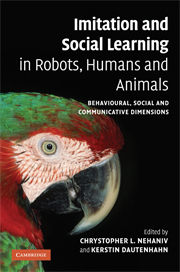 Imitation and Social Learning in Robots, Humans and Animals
Imitation and Social Learning in Robots, Humans and Animals Published online by Cambridge University Press: 10 December 2009
The following three chapters highlight the important role of synchrony and turn-taking in imitative interactions. Two particular aspects are emphasized in this section: firstly, the communicative role and function of imitation which, in particular in research involving robots or other artifacts, has often been neglected in favour of the skill acquisition aspect of imitation, and secondly, the dynamical nature of imitative interactions where synchrony and turn-taking facilitate inter-subjectivity, sharing of experience, communication and empathy.
The first two chapters in this section provide excellent examples of Braitenberg's synthetic psychology approach (Braitenberg, 1984) where the synthesis and study of artifacts (simulated agents or robots) can shed light on psychological phenomena that have been observed in humans and other animals. In experiments with artifacts the systems' design parameters as well as input/output characteristics can be accessed directly, which can give rise to studies and types of analysis otherwise impossible with biological systems. Both chapters demonstrate how psychological experiments have led to robotic experiments and computer simulations, whose results in turn can be compared to work in psychology and inform further studies and the development of theoretical frameworks that apply across biological and artificial systems.
Arnaud Revel and Jacqueline Nadel present inter-disciplinary work that compares imitation in human infants and autonomous robots, providing concrete examples from both research areas that are underpinning their framework. The chapter highlights the communicative function of synchronization and turn-taking.
To save this book to your Kindle, first ensure no-reply@cambridge.org is added to your Approved Personal Document E-mail List under your Personal Document Settings on the Manage Your Content and Devices page of your Amazon account. Then enter the ‘name’ part of your Kindle email address below. Find out more about saving to your Kindle.
Note you can select to save to either the @free.kindle.com or @kindle.com variations. ‘@free.kindle.com’ emails are free but can only be saved to your device when it is connected to wi-fi. ‘@kindle.com’ emails can be delivered even when you are not connected to wi-fi, but note that service fees apply.
Find out more about the Kindle Personal Document Service.
To save content items to your account, please confirm that you agree to abide by our usage policies. If this is the first time you use this feature, you will be asked to authorise Cambridge Core to connect with your account. Find out more about saving content to Dropbox.
To save content items to your account, please confirm that you agree to abide by our usage policies. If this is the first time you use this feature, you will be asked to authorise Cambridge Core to connect with your account. Find out more about saving content to Google Drive.